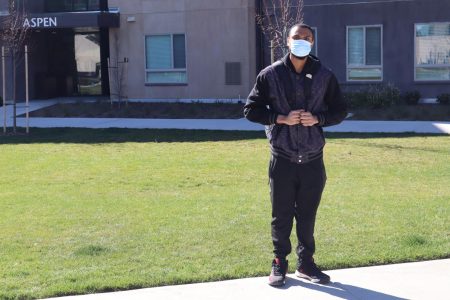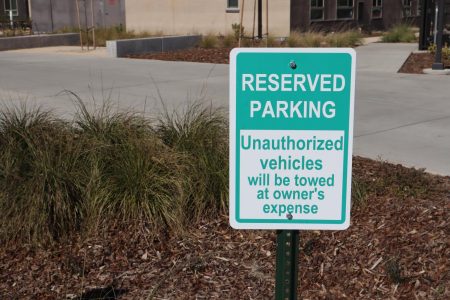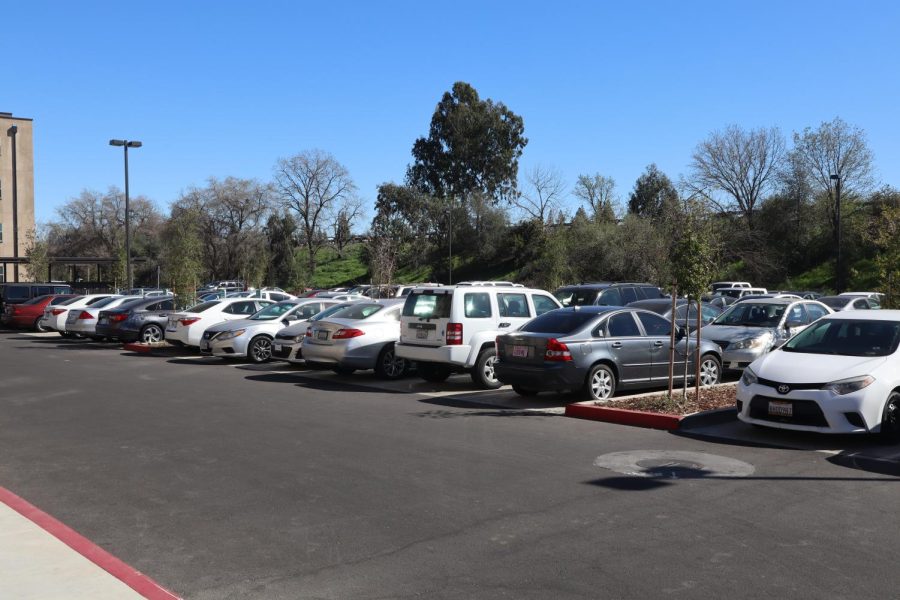Hornet Commons residents say that parking on property has been a constant struggle
The Hornet Commons resident parking lot filled on Feb. 21. Parking spots fill quickly, which some students have said forces them to park in farther lots from their home. (Photo by Collin Houck)
March 8, 2022
Robert Gonzalez is a second-year political science-international relation major at Sacramento State. He is one of the many residents living at the Hornet Commons who deal with a current issue that frustrates many students: parking.
“Parking fills up fast and it is going to be more filled than it already is now,” Gonzalez said.
However, several students have reported issues with parking in the lot outside the complex.
“They did sell out of parking permits pretty fast,” Gonzalez said. “I feel that they should have had a plan for this.”

The Hornet Commons released a statement via email regarding the parking situation saying that parking was not guaranteed for residents and that they were aware of the situation. There was even acknowledgment of there being a limited number of spots to park in, according to the email statement by the Hornet Commons.
The Hornet Commons said that they are monitoring the situation and are working to navigate the situation, according to the email.
According to some students, parking has not been an issue in the past but has recently become more of a hassle since students have returned to campus after its long-term closure due to COVID-19.
Mireya Nevarez, an exercise science major in her junior year at Sac State, has noticed the parking issues this semester and compared it to her first semester.
“My first semester was fine. I always had somewhere to park,” Nevarez, said. “Now there is nowhere to park.”
Nevarez said she is one of the many students living at the Commons who are going through the daily struggle of finding parking.
“I’m pretty sure we are at full capacity already,” Nevarez said. “I had to park across the street last night and pay a day ticket.”
Nevarez said that she had to park across the street and pay for a day ticket in order to avoid the $40 fine from UTAPS. When she reached out to an RA regarding the situation, they were unable to assist her in the matter.
When returning from picking up her car on campus, Nevarez noticed that a student received a citation for illegally parking at the Hornet Commons parking lot, due to the limited amount of spaces.
“Hornet Commons is selling more parking passes than parking spots,” Nevarez said.
Nevarez said she and other Hornet Commons residents have to park their cars on campus when there aren’t any open spaces at the complex.
“Some cars had reserved parking passes, which is crazy since they didn’t even find a spot,” Nevarez said.

“It will definitely change,” said Gonzalez. “I see students still moving in and I don’t know if they have a parking permit or not, but if they do, it’s going to fill up faster than it already is now.”
With parking becoming limited, residents such as Gonzalez have to park in other designated areas still associated with the Commons, but some, like Gonzalez, have said it is an inconvenience for residents.
Michael Barajas, a communications study major in his third year, believes that parking is a problem and that students have to park elsewhere just to be able to get home on a daily basis.
“I’m assuming students will have to park across the street from campus,” Barajas said. “Or they can park in front of Modoc Hall, but with a penalty.”
Parking has become hectic at times for many of these students, according to Barajas.
“Yes, finding a parking space can be quite tricky,” Barajas said. “I have heard that students have not received their parking pass (reserved and unreserved) so I can only imagine how messy it would be if everybody got their pass.”
Chibike Anubalu is a third-year psychology student who believes that since he is a resident of the Hornet Commons, parking should not be as difficult as it has become.
“I feel like since we pay rent to stay here, it should be easy,” Anubalu said. “Instead of people paying for a parking permit to park somewhere else, we should be able to park here.”
According to Anubalu, he had recently bought his parking permit, but because of the limited spaces, he is unsure where he will be parking.
“I saw a few students’ cars being towed,” Anubalu said. “They live here and pay rent every month andthey still towed their cars.”


































































































































